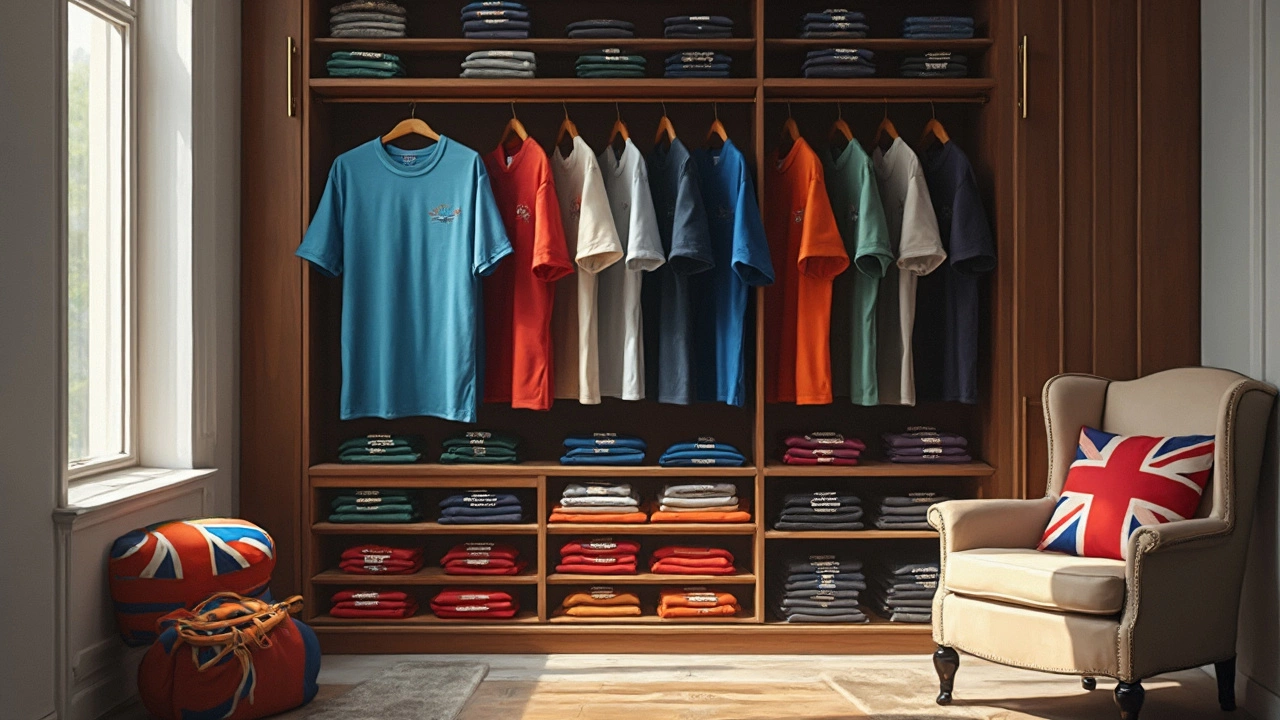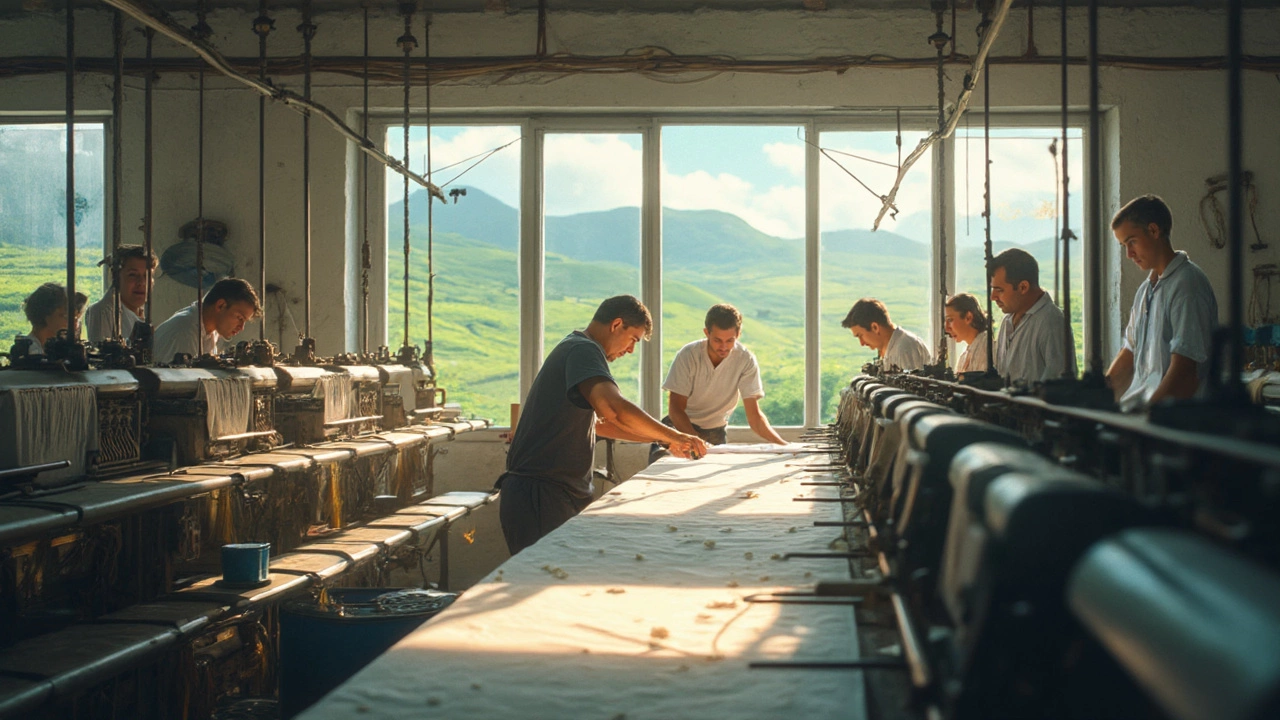Ever noticed how some t-shirts seem to stick around forever, while others fade and stretch out after just a few washes? It's not just luck; there's a science behind choosing the right t-shirt if you want it to last.
First off, let's talk fabric. Cotton is often a go-to choice because it's breathable and comfortable, but not all cotton is the same. Look for t-shirts made from long-staple cotton, like Egyptian or Pima, which is smoother and tends to last longer. Then there’s the construction: tightly knit fabrics usually hold up better over time.
But it's not just about the materials. The way you care for your clothes makes a huge difference, too. Washing in cold water, air drying, and avoiding bleach can significantly extend a t-shirt’s lifespan and keep it looking fresh.
- Fabric Matters
- Construction Quality
- Proper Care and Maintenance
- Environmental Impact
- Cost vs. Durability
- Brand Recommendations
Fabric Matters
When it comes to picking a t-shirt that will last, the fabric is the foundation of it all. Let's dive into why the type of fabric used can make or break your favorite tee.
First, understand that not all cotton is equal. Regular cotton, often used in mass-produced clothing, can be rough and prone to pilling. On the other hand, long-staple cotton varieties, like Pima and Egyptian cotton, have fibers that are longer, making them smoother and more durable. They resist fraying and wear, which is why a t-shirt made from these materials might cost more but ends up being a better investment.
Another option is blends. A cotton-polyester blend combines the comfort and breathability of cotton with the durability of polyester. This makes the fabric less prone to shrinking and helps maintain the t-shirt's shape over time. Blends like this are popular for activewear for a reason!
For those interested in sustainable options, t-shirts made from organic cotton or recycled materials are becoming more common. Organic cotton isn't treated with chemicals or pesticides, which is better for the environment and can be gentler on your skin. If you see a label with bamboo or hemp, they're also fibrous choices known for being tough and eco-friendly.
If you're still unsure about what fabric will work best, consider what your usual activities involve. Heavy-duty work might require something more robust, while a soft, 100% cotton tee might be perfect for relaxing at home.
| Fabric Type | Durability Level | Best For |
|---|---|---|
| Regular Cotton | Medium | Everyday wear |
| Pima/Egyptian Cotton | High | All-purpose, long-lasting |
| Cotton-Polyester Blend | High | Activewear |
| Organic Cotton | Medium-High | Sustainable choice |
Remember, investing in high-quality fabric might mean spending a bit more upfront, but it pays off with a clothing item that stands the test of time.
Construction Quality
If you've ever wondered why some t-shirts seem to unravel while others hold tight, it often boils down to construction quality. Ever noticed a t-shirt's seams? Next time you're shopping, examine if the stitching is even and tight. This little detail can mean the difference between a shirt that becomes a wardrobe staple and one that quickly becomes a rag.
Opt for t-shirts with a double-needle stitch, which is a sign of better quality. This type of stitching uses two rows of thread, making it more durable against wear and tear. Also, look out for taped neck and shoulder seams. This reinforcement prevents stretching and adds longevity to your garment.
Let's not forget the collar band. A ribbed collar that bounces back to shape after you stretch it usually signals higher quality. Compare it to a flimsier collar that stays stretched out – that's not what you want!
If you're considering investing in t-shirts, know that paying a little more for better construction can actually save money in the long run. A well-constructed t-shirt can outlast cheaper options, maintaining its shape and look through countless washes.
Sometimes, it's also about trusting brands that are known for their quality. Some brands pride themselves on offering longevity with reinforcements in all the right places. Cross-reference reviews and customer testimonials for insights on which labels consistently deliver.
Proper Care and Maintenance
So, you've snagged an awesome t-shirt, and you want it to last. The good news is a few simple changes in how you care for your clothes can make a world of difference. Let’s break it down with some easy steps you can follow.
First off, remember: cold water is your best friend. Washing your t-shirts in cold water is not only energy-efficient but also less harsh on the fibers. It helps maintain color and fabric integrity, which means your tees stay looking crisp longer.
When it comes to drying, it's best to give your t-shirts a break from the dryer. High heat can wear down the material quickly. Instead, try air drying them. Just hang them up, and let nature do the rest—this way, you'll avoid unnecessary heat damage.
Another key tip is to wash your t-shirts inside out. This simple trick reduces friction, so prints stay intact and any pilling on the outside is minimized. Also, don’t overdo the detergent. A little goes a long way, and too much can leave residue that actually weakens the fabric over time.
Here's a quick list for keeping those t-shirts in top shape:
- Use cold water to reduce fabric stress and retain color.
- Hang dry whenever possible to avoid heat damage.
- Wash inside out to protect prints and reduce pilling.
- Go easy on the detergent to prevent buildup.
If you follow these care practices, you'll definitely notice your favorite t-shirts hanging around your closet a lot longer.

Environmental Impact
When it comes to t-shirts, the planet feels the effects long after the checkout line. Ever thought about why some t-shirts are labeled 'eco-friendly'? It’s more than a marketing gimmick.
For starters, the production of conventional cotton t-shirts uses a massive amount of water and pesticides. In fact, around 2,700 liters of water are needed to make just one t-shirt! That’s enough for one person to drink for over two years.
But there's a shift happening. More brands are turning to organic cotton and recycled materials, which drastically cut down on water usage and avoid those nasty chemicals. Organic cotton uses 91% less water compared to its conventional cousin.
Then there's the problem of fast fashion. Clothing manufactured at lightning speed often ends up in the trash just as quickly. Long-lasting, durable t-shirts help combat this cycle by not just saving you money but also reducing textile waste.
If you're shopping for environmentally-friendly t-shirts, look out for certifications like GOTS (Global Organic Textile Standard) or OEKO-TEX. These labels ensure a product's made with the planet in mind.
| Type | Water Usage (liters) |
|---|---|
| Conventional Cotton | 2,700 |
| Organic Cotton | Less than 300 |
Every choice counts. By opting for sustainable t-shirts, we can make a big difference for the environment. And that feels pretty good.
Cost vs. Durability
When it comes to buying t-shirts, price is often a big consideration. It's easy to assume that pricier garments mean better quality, but that's not always the case. The key is understanding how cost correlates with durability.
Generally, t-shirts made with higher quality materials and better construction methods do cost more, but they also tend to last longer. For example, a higher-priced T-shirt made with long-staple cotton and double-stitched seams is likely to outlive a cheaper alternative made from regular cotton and basic stitching.
However, not all expensive t-shirts deliver on durability. Some brands might charge premium prices due to branding rather than actual quality differences. It’s crucial to check fabric details and construction techniques over brand names or logos.
Here's a simple tip: check for details like stitching quality and fabric weight. Heavier-weight fabrics usually indicate a denser knit, which can mean greater longevity.
Rarely, an inexpensive t-shirt might surprise you with its wearability. But more often than not, a modest investment in quality pays off in the long run. Take time to assess whether the extra dollars spent now will save you from frequent replacements later.
| Price Range | Typical Lifespan |
|---|---|
| Under $10 | 6 months to 1 year |
| $10-$30 | 1 to 3 years |
| $30 and above | 3 years and more |
This table is a rough guide. Your own results may vary depending on how you care for your clothes. Which brings us to another important point: durability isn’t just determined by cost and materials. It’s also about the TLC you give your clothes.
Brand Recommendations
When it comes to t-shirts, finding a reliable brand can save you time and money in the long run. Here, we're diving into some brands that have earned a reputation for quality and longevity, so your wardrobe investment pays off.
Uniqlo is a crowd favorite for basic tees that don't break the bank. Their Supima cotton tees are known for soft texture and durable quality. Customers often rave about how well these shirts hold their shape and color after multiple washes.
If you’re willing to splurge a bit, check out Everlane. Their tees are crafted with sustainability and quality in mind. The brand's commitment to ethical production remains strong, and they use fine materials that stand the test of time.
For those who value organic materials, look no further than Patagonia. Their organic cotton tees not only provide quality but also align with eco-friendly choices. They’re durable, comfortable, and made to last.
On a tighter budget? Hanes still has your back. They're your classic go-to for durable, no-frills t-shirts. While they might not be the most stylish option, their basic line is affordable and has a long-standing reputation for quality.
Choosing the right brand can make a huge difference. Consider your needs, whether it's affordability, sustainability, or simply style. By selecting wisely, you'll find t-shirts that not only fit your lifestyle but also last longer, ensuring a more sustainable wardrobe.
